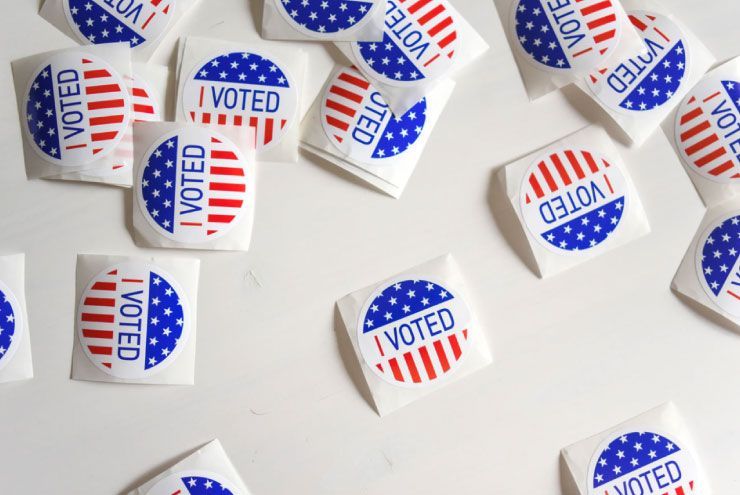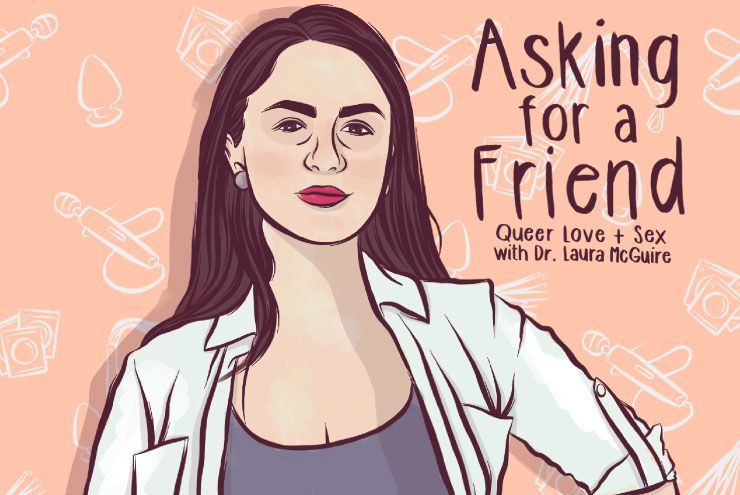By Rachel Abbott
Texans (and American voters everywhere), the presidential primary election draws near! Although we are no longer contending with a whole circus of Democratic candidates, there are still a lot of people running in hopes of beating Donald Trump. It can be difficult to sift through the endless articles, advertisements, and heated debates to get to the true heart of these candidate’s issues. That’s why I have created this quick and easy guide to understanding each of the candidates’ stance on LGBTQ+ issues.
I evaluated the candidates on two simple metrics: how they have voted on LGBTQ+ policy in the past and what they have planned for queer voters if they win the presidency. If you’re short on time, there is a TL;DR for each candidate, but I do hope you’ll read the full article. When queer and trans rights come under attack daily from religious and conservative parties, it’s vital now more than ever to have candidates that have a strong history and promising future with the LGBTQ+ community. So let’s get into it.
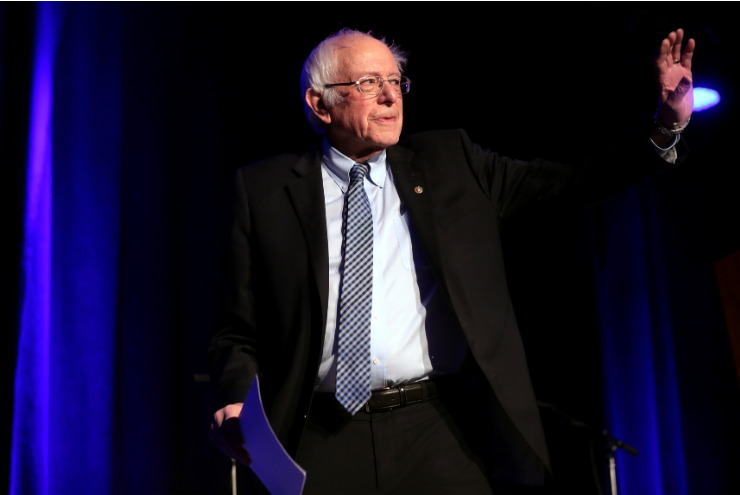
Bernie Sanders, the senator from Vermont, is either hailed as a champion of progressive policy or demonized as a socialist, depending on who you ask.
His history:
Senator Sanders has a long history of supporting gay rights, dating back to the early 1980s when he was the mayor of Burlington, Vermont. He supported the first Burlington Pride parade in 1983, and he signed a proclamation for protections against LGBTQ+ housing discrimination in 1985. As far as American politicians go, that is a really good record. However, like many of his contemporaries, Sanders maintained that marriage equality should be an issue of states’ rights, rather than national legalization, until around 2009. As marriage equality is a cornerstone of the fight for LGBTQ+ rights, that record may be a slight disappointment to some voters. However, his LGBTQ+ support predates other notable political figures, such as Barack Obama and Elizabeth Warren, by a few years. All in all, he has the strongest record of LGBTQ+ support out of all the candidates.
His policy:
Sanders has a few key policy points highlighted on his website. His three main goals are:
- Prohibit LGBTQ+ discrimination by passing the Equality Act, Every Child Deserves a Family Act, and other similar bills
- Universal healthcare for LGBTQ+ people, free from provider discrimination
- Work to reduce bullying and suicide of LGBTQ+ young people
His website expands on specific policies and the departments that will enact those policies. All in all, it’s a great plan. From protecting queer youth to issues of homelessness and bank discrimination, the plans are expansive and actionable. He also specifically mentions trans rights by intending to repeal the transgender military ban, train police for better interaction with trans people, and make “non-binary” a nationally recognized gender identity. Queer and trans people will find a lot to love in Sanders’ policy proposals.
TL;DR: His history of LGBTQ+ support goes back further than any other candidate in the race, and his policy is solid and thorough. When looking for an LGBTQ+ ally, Bernie Sanders is a great candidate.
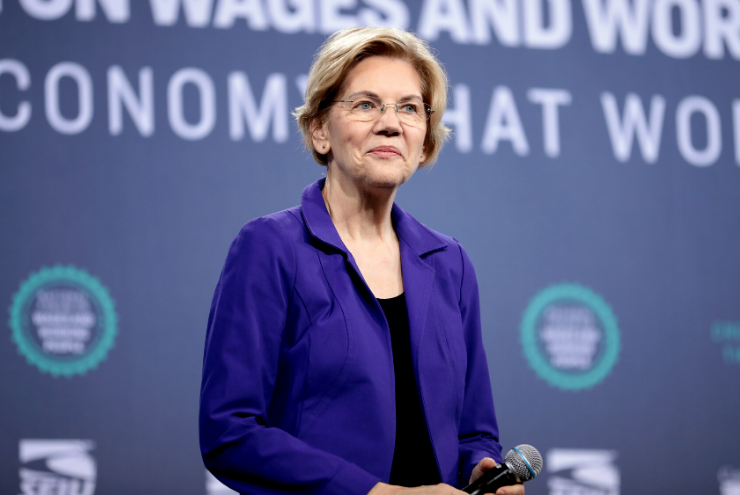
Elizabeth Warren is a Massachusetts senator and former law school professor. Like Sanders, she’s one of the more progressive candidates in the race for the Democratic nomination.
Her history:
Warren has historically been a supporter for LGBTQ+ equality, though evidence of that voting and policy history doesn’t go back nearly as far as Senator Sanders. The first evidence of her support for marriage equality, for instance, dates around 2011. Most likely, this is due to her career history. Warren worked as a bankruptcy lawyer and law professor long before joining the political sphere. When she did jump into politics, she was working on the Consumer Financial Protection Bureau and Congressional Oversight Panel—not exactly hot places for civil rights activism.
Still, nearly a decade of LGBTQ+ support is noteworthy. Like Senator Sanders, she supported marriage equality before then-president Barack Obama. Similarly, she supported the repeal of the Defense of Marriage Act (DOMA) and Don’t Ask Don’t Tell (DADT). She urged the Senate to pass the Employment Non-Discrimination Act (ENDA), which would have provided workplace protections for LGBTQ+ people, though this bill never passed in the House. All in all, her record shows that during her tenure as a U.S. senator, she has been an ally to LGBTQ+ people.
Her policy:
Where Sanders shines in his long-term record, Warren shines in her extensive policy proposals. Truly, I urge you to look at her website, because the breadth and thoroughness of her policy is impressive. She breaks her policy proposals down into a handful of main categories: equal justice and non-discrimination, support for LGBTQ+ youth and families, affordable housing, empowering LGBTQ+ workers, criminal justice reform, inclusive and gender-affirming healthcare via Medicare for all, ending the HIV/AIDS epidemic, fighting for LGBTQ+ rights in foreign policy, improving data collection, and ending the murders of transgender women of color.
If these policies sound broad, it’s just for lack of space. She goes into further detail on the specific acts, bills, and committees that can make these goals actionable on her website. All in all, she takes her biggest-hitting campaign ideals (Medicare for All, criminal justice reform, and monetary relief for lower- and middle-class people) and makes them specific to her LGBTQ+ audience. She makes notable mention of intersectional disadvantages that LGBTQ+ people face, such as poverty, targeting by the police, and discrimination by healthcare providers. Her policy proposals are the strongest of any candidate.
TL;DR: Although her history as an LGBTQ+ advocate doesn’t go back as far as Senator Sanders, her policy is the best in the game. Her plans are specific and detailed, which makes them seem achievable. She would be a great candidate for LGBTQ+ voters.
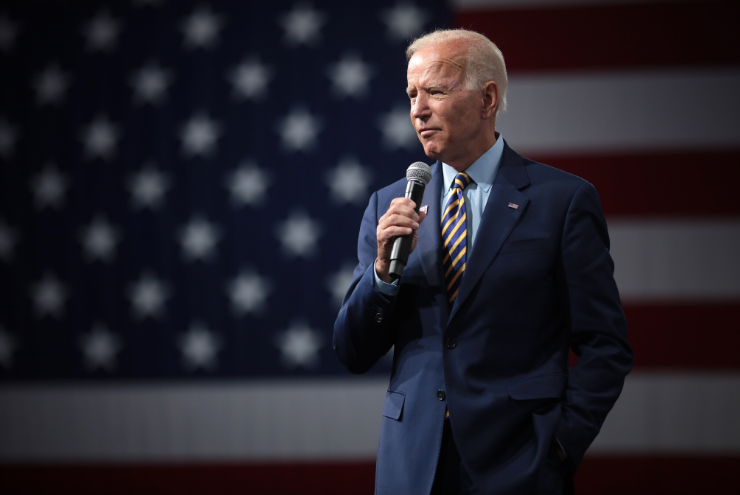
Joe Biden is the former Vice President under Barack Obama and former senator of Delaware. He polled high at the beginning of the election cycle but has drawn criticism from more liberal Democratic Party members for his centrist views.
His history:
Biden has a mixed history on LGBTQ+ rights and policy. He supported DOMA in the 1990s, and then pointed to the policy as a reason that marriage equality should be an issue of states’ rights—which both protected marriage equality from being fully banned and also held it back from being legalized on a national level. He also voted for DADT as a part of a larger defense bill, though he later supported the repeal. Still, he does have some notable bright spots in his tenure as a politician. He publically supported the national legalization of gay marriage in 2012, which analysts see as an engine that expedited President Obama’s eventual support as well. He’s been a proponent for hate crime prevention since the late 1980s, and he’s also a longtime supporter for AIDS research and funding. All in all, his history on LGBTQ+ rights fits his political modus operandi—centrist and pragmatic, not revolutionary, but not bad either.
His policy:
Per his website, Biden’s policy proposals are, well, pretty slim. They’re certainly the shortest plans out of all of the candidates. He mentions three main goals for achieving LGBTQ+ equality: passing the Equality Act, reversing the transgender military ban, and supporting LGBTQ+ students. These are good policy proposals; all three would be important stepping stones for non-discrimination and quality of life improvement. However, compared to the extensive plans from Warren and Sanders, there’s nothing exciting here. A leader for LGBTQ+ equality should have more to offer.
TL;DR: Joe Biden’s history is pretty much what you’d expect from a moderate Democrat—he’s supported LGBTQ+ rights over all, but he hasn’t always been a great ally. When combining his decent history with his lacking policy proposals, he’s only okay. There are stronger candidates for LGBTQ+ equality.
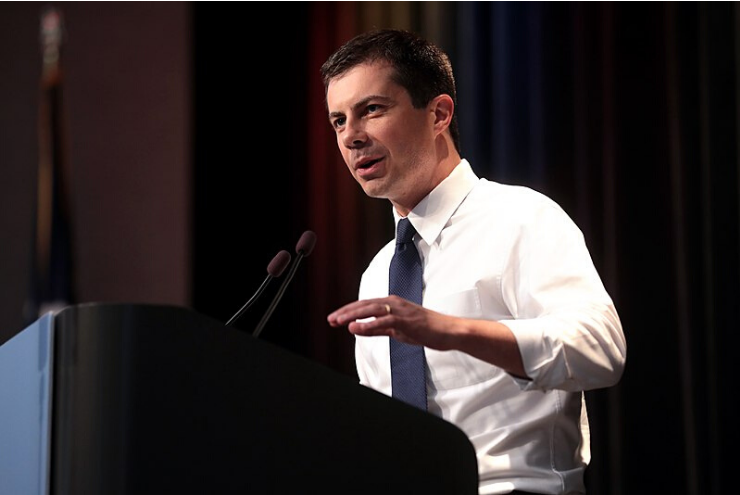
Pete Buttigieg is the mayor of South Bend, Indiana. Notably, Buttigieg is the first openly gay person to run a major presidential campaign in American history, and he’s the youngest person currently running.
His history:
Shockingly, there’s precious little information available to vouch for Buttigieg’s LGBTQ+ advocacy or voting history—personally or professionally. After attending Harvard and Oxford, Buttigieg worked as a financial consultant and then a naval intelligence officer. Prior to running for any office, he worked on a few Democratic campaigns. In fact, when he became the mayor of South Bend in January of 2012, Buttigieg wasn’t publicly out of the closet. He didn’t come out until 2015, when he was running for reelection (which he won by a landslide). Even during his tenure as South Bend mayor, it seems that he’s done little to advance LGBTQ+ causes other than publically being gay. When several heterosexual candidates have more impressive voting and advocacy histories than an actual gay man, it doesn’t look great. Buttigieg must rely on current policy to make up for this blank slate of advocacy.
His policy:
Fortunately, Buttigieg’s policy can hold its weight with Warren and Sanders, as it should. His website lays out several plans for furthering LGBTQ+ equality. At a glance, his focuses include: legal equality, inclusive and preventative healthcare, support for youth and families, greater justice, community support, honoring queer leaders and veterans, and pushing for better LGBTQ+ policy on a global scale. Notable highlights of these initiatives include ending conversion therapy on a national scale, ending the ban on blood donations from queer men, and funding the documentation of queer arts and culture. He also pays attention to issues of trans liberation and justice, such as ending the transgender military ban and supporting trans women of color. All in all, his policy touches on many of the issues facing the LGBTQ+ community right now. Even if he cannot secure the nomination, his solid policy goals could lead to a future in advocacy and leadership for the queer community.
TL;DR: Pete Buttigieg’s history of LGBTQ+ advocacy is practically non-existent, but he has solid policy proposals working for him now. If he doesn’t secure the nomination, Buttigieg could (and should) use his privilege as a white, highly educated, gay public figure to gain experience in advocating for the more vulnerable members of his community.
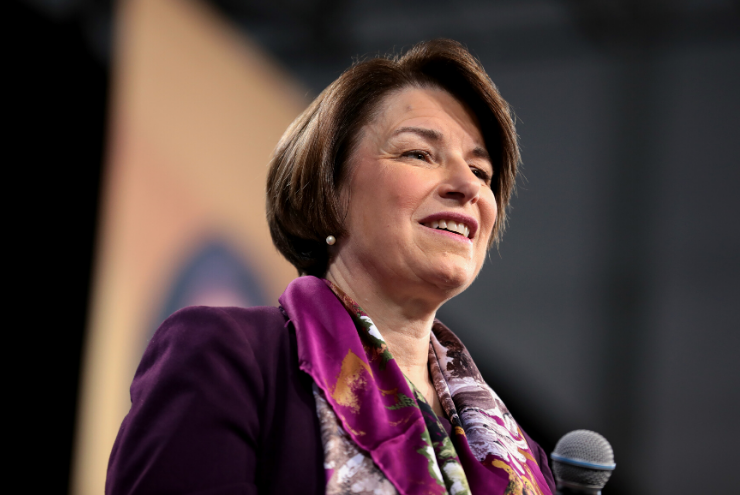
Amy Klobuchar is a Minnesotan senator and former Hennepin County Attorney. She saw a surge in votes during the New Hampshire primary, though she’s still far from being the leading Democratic candidate in this race.
Her history:
Senator Klobucher doesn’t have the stronger history of support for LGBTQ+ people, though she is not the weakest candidate either. It is typical from what you would expect of a moderate Democrat that still hopes to sway certain red-county Midwestern voters. She supported the repeal of DADT and she cosponsored the bill that repealed DOMA. Like Warren, she supported ENDA. However, she historically argued that civil unions were preferable to full marriage equality, and she didn’t change that stance until mid-2012, after President Obama had announced his support. Former staffers noted that she has remained mum on the issues of LGBTQ+ equality when it wasn’t convenient to her political goals. Again, it’s not the strongest showing in a full field of candidates.
Her policy:
It takes some clicking around to find Klobucher’s LGBTQ+ policy proposals on her website. They don’t receive a main header, like her healthcare and climate policy do, which makes them seem low priority. However, once you access her plan through a separate link under the obscure title “Amy’s Policies,” the plans are pretty good.
Her main policy goals: improving access to healthcare, standing up for civil rights, advocating for children, families, employment, and economic inclusivity, and supporting LGBTQ+ rights abroad. She mentions many of the same hot-button issues as Sanders, Warren, and Buttigieg, such as ending HIV/AIDS, reversing the transgender military ban, passing the Equality Act, and restoring asylum for queer and trans refugees. However, given that Klobucher is a more moderate candidate, it’s hard to imagine that she would achieve these common goals better than, say, Sanders or Warren. For instance, Klobucher openly does not support Medicare for All, a policy that would make it significantly easier for all LGBTQ+ people to receive healthcare. Her ideas for LGBTQ+ policy may be strong, but I wonder how she could achieve them without adopting a more liberal economic ideology. It’s a classic case of “socially liberal, fiscally conservative,” and it doesn’t appeal to most young or queer voters.
TL;DR: Senator Klobuchar falls short when it comes to impressing prospective LGBTQ+ voters, both in terms of her policy history and her proposed goals. Although her plans for queer and trans advancement offer a lot, her more moderate economic policy makes those policies less attainable than her more progressive counterparts. There are better candidates for LGBTQ+ people.
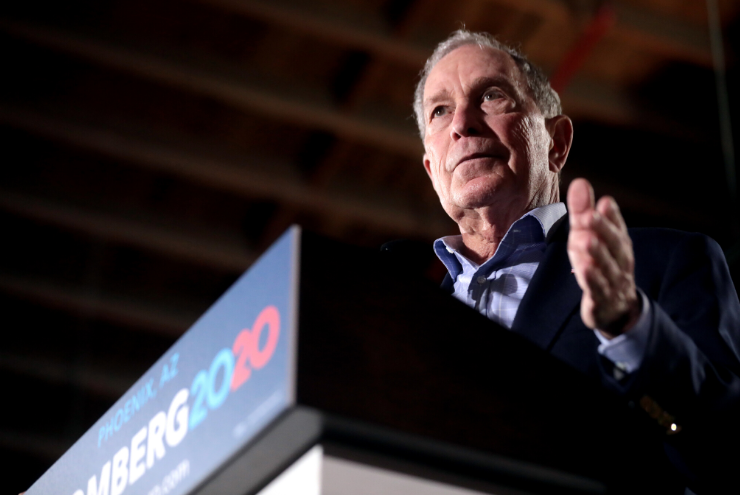
Mike Bloomberg is the former mayor of New York City, businessman, and billionaire. He’s come under fire from both his primary opponents and from residents of New York City who recall his tumultuous political past.
His history:
Bloomberg has previously registered as a Republican, an Independent, and as a Democrat, so it’s no surprise that his history is a mixed bag, with a lot of bad. Like his history of racial profiling as New York City mayor, Bloomberg’s history on LGBTQ+ equality will leave queer voters with a bad taste. He has a history of making transphobic comments, even though one of his first acts as mayor was to sign a transgender civil rights bill. He was an early supporter of marriage equality, but NYC residents accuse him of slouching on advocacy for the more vulnerable members of the community. As journalist Kerry Eleveld wrote back in 2013, “Like so many things in life, where you stand on Bloomberg’s contribution to the LGBT movement depends on where you sit…Those who work on issues of poverty and homelessness, which disproportionately affect LGBT youth, dismiss him as an impervious economic elitist who has largely turned a blind eye to New York’s record homeless population and an inadequate shelter system.”
His policy:
Like Joe Biden, Bloomberg’s plans fall on the skimpier side of policy proposals. He focuses on a few main categories of queer and trans advancement: passing the Equality Act, improving healthcare coverage and treatment, ending HIV/AIDS by 2030, protecting LGBTQ+ youth and families, criminal justice reform, and reversing the transgender military ban. These are hot topics in the fight for equality, but his website is notably lacking in specifics on how to achieve these broad goals. For instance, he doesn’t mention how he plans to eradicate HIV/AIDS by 2030, nor what his “Medicare-like public option” will offer that the ACA hasn’t. With Warren and Sanders leading the race in specific and actionable policy proposals, Bloomberg’s offerings fall short.
TL;DR: With a mixed history of LGBTQ+ advocacy and underwhelming policy proposals, Mike Bloomberg has little to offer queer and trans voters. In fact, he is probably the worst of the remaining viable candidates. Voters should look elsewhere for an ally.
Those are the basic facts. Of course, I encourage all of our readers to expand their research before making their vote. Issues of race, class, healthcare coverage, and the environment have intersecting impacts on our queer lives. There’s no one perfect candidate, especially in a race this crowded, but there are multiple strong contenders. I personally recommend Senator Bernie Sanders or Senator Elizabeth Warren as the best options on LGBTQ+ policy in particular. Check out their stances on other issues to decide who deserves your vote on or before March 3rd. Then get out and vote!
Early voting runs now until February 28. Primary Election Day in Texas is March 3. Find your polling place at votetexas.gov/voting/where.html. Check your voter registration at teamrv-mvp.sos.texas.gov/MVP/mvp.do.


